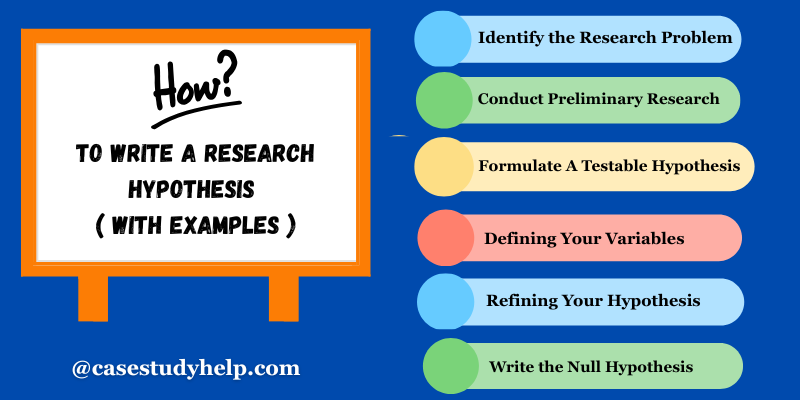Are you a college or university student? Are you under the massive pressure of your research hypothesis paper? This blog will examine how to write a research hypothesis paper.
What Is a Research Hypothesis?
A research hypothesis is a specific, clear, and testable statement that predicts the relationships between 2 or more variables. It is an observation based on education that guides your research process.
When Should You Start Writing a Hypothesis?
A hypothesis is typically a statement that is tested by scientific research. When you want to test the relationship between 2 or more variables, you must write your hypothesis before starting your experiment or the data collection process.
Also Read: 130+ Education Research Topics & Ideas You Must Know
Key Characteristics of an Effective Hypothesis
Key characteristics of a reasonable hypothesis are that it always needs to be very clear, testable, and grounded in your existing knowledge. It should also be falsifiable, specific, and relevant to the research question and answers. It is detailed as follows:
- Specificity and clarity: A reasonable hypothesis is always written clearly and unambiguously.
- Testability: the hypothesis always needs to be capable of being tested via experimentation or observation. There should also be a way to collect data to support your hypothesis.
- Falsifiability: The hypothesis needs to be proved wrong; otherwise, it cannot be tested scientifically.
- Relevance and grounded in knowledge: a reasonable hypothesis should always relate to its research question and contribute to the existing knowledge body.
- Consistency: an ideal hypothesis needs to be internally and externally consistent without any ambiguities.
- Simplicity: It should be as concise and straightforward as possible, accurately representing the given variables.
Not sure when to start writing your hypothesis? Our dissertation experts guide Masters and PhD students at every stage—from topic selection to final research paper topics.
When Should You Start Writing a Hypothesis?
You can start writing a hypothesis after conducting the following functions:
- Ask a question
- Conduct your preliminary research
- Define the variables
- Phrase it with an “if then” statement
- Collect relevant data to support your hypothesis
- Write with confidence
Confused about how to write a hypothesis? Hire our dissertation experts for step-by-step guidance. We help Masters and PhD students craft strong, research-driven hypotheses with clarity and precision.
Types of Research Hypothesis Explained
There are broadly two types of hypothesis in research: null and alternative. Hypothesis can be classified into simple, complex, directional, non-directional, causal, and complex types.
This is explained as follows:
- The null hypothesis assumes no such relation or difference between the studied variables.
- The alternative hypothesis states the opposite of the null hypothesis and suggests a relationship or difference exists.
- Simple hypothesis: This type of hypothesis can predict the connection between one independent and one dependent variable.
- A complex hypothesis predicts the relationship between 2 or more dependent and independent variables.
- Directional hypothesis: It predicts the direction of the relationship, either positive or negative.
- Non-directional hypothesis: This type of hypothesis predicts that a connection exists, but does not specify the path.
- The associative hypothesis implies that all the differences in one variable are associated with the changes in the other.
- Causal hypothesis: This suggests that a change in any variable causes a change in another.
For you: How to Write a Thesis Statement: A Comprehensive Guide
Hypothesis vs. Prediction: What’s the Difference?
Hypothesis vs. prediction: A hypothesis is typically a proposed explanation for any phenomenon or observation, while a prediction is a statement about any future outcome or event.
Hypothesis is usually testable, while the predictions are mainly derived from the hypothesis. This can be detailed as follows:
- A hypothesis is a testable statement that always proposes a possible explanation for an observation. It serves as a beginning point for any scientific investigation during any research procedure.
- Prediction: It is typically a statement regarding what can happen in the future and is based on a hypothesis. It is a particular and measurable outcome often used to test the validity of any hypothesis.
- Focus: A hypothesis explains any phenomenon, while a prediction forecasts any future event.
- Scope: The hypothesis is broader and more generalized, while the predictions are more specific.
- Testability: the hypothesis is designed to be tested via experiments or observations, while the predictions are the expected results of such tests.
- Relationship: The predictions are often derived from the hypothesis and serve to evaluate the validity of the hypothesis.
One more: The Ultimate Step-by-Step Guide to Writing a Thesis Paper
How to Write a Research Hypothesis (With Examples)
- Identify the research problem: Here, you need to start with any specific area that interests you with a question. Example: Can the amount of time we spend on social media affect our academic performance?
- Conduct preliminary research: Review the existing literature and studies on your topic.
- Formulate a testable hypothesis: Based on your research findings, you need to develop an obvious and concise statement that predicts the relationship between your variables.
- Defining your variables: You always need to clearly identify your dependent and independent variables and how they can be measured.
- Refining your hypothesis: Always ensure it is measurable, specific, testable, and relevant to your research question.
- Write the null hypothesis: There are no differences in plant growth between the plants that receive more sunlight and those that get less sunlight.
Stuck crafting your research hypothesis? Hire our PhD experts for your research paper. From literature review, research proposal, and data collection & analysis (SPSS, R, NVivo) to methodology, dissertation chapters, conference papers, and thesis writing—we ensure originality, critical insights, and on-time delivery.
How To Write A Research Hypothesis
Study about the customer behaviour:
- Does the colour of any website’s call-to-action button affect its click-through rates?
- Hypothesis: The people who spend more time on social media have higher anxiety levels than those who spend less time on it.
- Null hypothesis: There is no relation between the amount of time spent on social media and the anxiety levels.
Hypothesis Example in a Research Paper
Examples Of Research Hypothesis Are As Follows:
Simple hypothesis:
Example: More study time leads to higher exam scores.
Lesser screen time before sleep boosts sleep quality.
Complex hypothesis:
For example, drivers who talk while driving are more prone to road accidents than those who don’t.
Directional hypothesis:
For example, more sun exposure increases the chances of skin cancer.
Employees working from home have lower chances of quitting than those working from the office.
Non-directional hypothesis:
Ex: College students will perform memory tasks differently from elementary school students. (This hypothesis states that there will definitely be a difference, but it does not indicate the direction of the difference.)
For example, customers exposed to advertisements have a different level of awareness than those not exposed.
Conclusion: Mastering the Art of Hypothesis Writing
Mastering the art of hypothesis reseach paper writing tips involves making obvious, testable, and falsifiable predictions regarding the relationships between the variables in your research proposal.
A methodical approach is always needed, starting with a straightforward research question culminating in a specific statement to guide your research procedure. This can be explained as follows:
Need a clear hypothesis example and guide for your research paper? We offer step-by-step guidance on crafting strong, testable hypotheses for Master’s and PhD students. You can also get free academic samples to help you understand the hypotheses in research papers.
Write An Obvious Research Question:
- Here, you must always begin with a particular and focused research and quantitative methods question your research aims to answer.
- This research question must always be relatively narrow to be testable and broad enough to be meaningful.
Conduct The Preliminary Research:
- Before formulating your hypothesis, review existing literature and research your topic.
- This research process will always help you understand the known and identify gaps in your knowledge so that you can develop a more informed hypothesis.
- You must always identify all the relevant variables with potential relationships between them.
- The statement should always be clear, concise, and testable.
- Since it is researchable, you need to use the “if then” structure. For example, if students increase their study time, their test scores will also improve automatically.
Refine Your Hypothesis:
- After formulating your hypothesis, you must refine it based on your research and understanding of the topic.
- It must be clear, concise, and aligned with your research objective and question.
- The null hypothesis states no relationship between the research variables.
- The alternative hypothesis states a clear relationship between the research variables.
Here, you always need to consider the research context and the variables in the following way:
- Identify all the dependent as well as independent variables in your research.
- Consider all the potential confounding variables that influence the relation between all variables.
- Always be very careful regarding the context of your research work and how it can affect the final result or inferences.
Read more: How to Write a Good Dissertation Paper
Thus, you can see that writing a perfect research hypothesis is not easy; therefore, you always need the best dissertation help online provider in this regard. Casestudyhelp.com is the best choice for you.
We will always help you get top grades by providing original, flawless research hypothesis papers for college assignments and university assignments.
Author Bio:
 Hi, I am Louis Hill, the author of this blog. I am a well-experienced academic writer. We’ll help make your writing shine.
Hi, I am Louis Hill, the author of this blog. I am a well-experienced academic writer. We’ll help make your writing shine.
Don’t hesitate to contact us anytime, tell us about your topic, and receive a 100% plagiarism-free paper with impeccable grammar and formatting.


